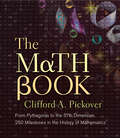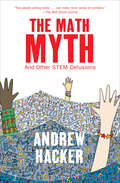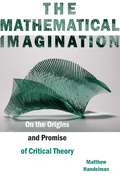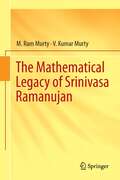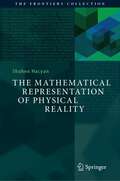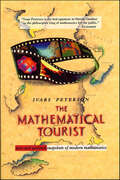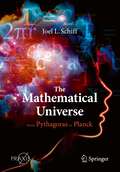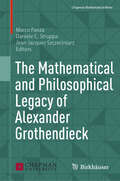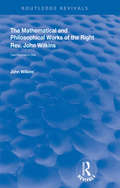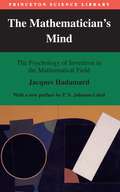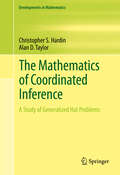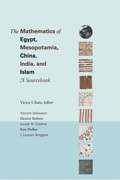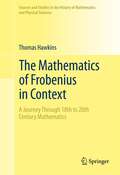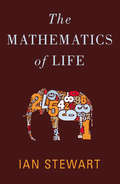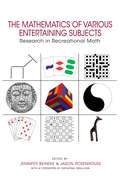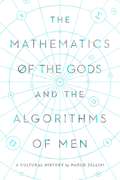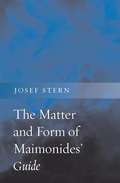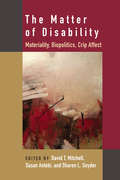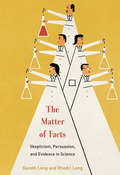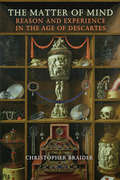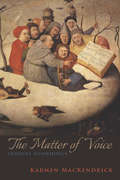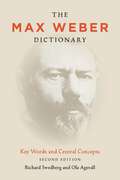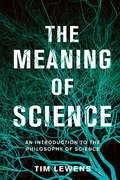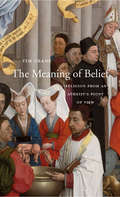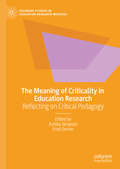- Table View
- List View
The Math Book: From Pythagoras to the 57th Dimension, 250 Milestones in the History of Mathematics (Union Square & Co. Milestones)
by Clifford A. PickoverThe Neumann Prize–winning, illustrated exploration of mathematics—from its timeless mysteries to its history of mind-boggling discoveries. Beginning millions of years ago with ancient “ant odometers” and moving through time to our modern-day quest for new dimensions, The Math Book covers 250 milestones in mathematical history. Among the numerous delights readers will learn about as they dip into this inviting anthology: cicada-generated prime numbers, magic squares from centuries ago, the discovery of pi and calculus, and the butterfly effect. Each topic is lavishly illustrated with colorful art, along with formulas and concepts, fascinating facts about scientists’ lives, and real-world applications of the theorems.
The Math Myth: And Other STEM Delusions
by Andrew HackerA New York Times–bestselling author looks at mathematics education in America—when it&’s worthwhile, and when it&’s not. Why do we inflict a full menu of mathematics—algebra, geometry, trigonometry, even calculus—on all young Americans, regardless of their interests or aptitudes? While Andrew Hacker has been a professor of mathematics himself, and extols the glories of the subject, he also questions some widely held assumptions in this thought-provoking and practical-minded book. Does advanced math really broaden our minds? Is mastery of azimuths and asymptotes needed for success in most jobs? Should the entire Common Core syllabus be required of every student? Hacker worries that our nation&’s current frenzied emphasis on STEM is diverting attention from other pursuits and even subverting the spirit of the country. Here, he shows how mandating math for everyone prevents other talents from being developed and acts as an irrational barrier to graduation and careers. He proposes alternatives, including teaching facility with figures, quantitative reasoning, and understanding statistics. Expanding upon the author&’s viral New York Times op-ed, The Math Myth is sure to spark a heated and needed national conversation—not just about mathematics but about the kind of people and society we want to be. &“Hacker&’s accessible arguments offer plenty to think about and should serve as a clarion call to students, parents, and educators who decry the one-size-fits-all approach to schooling.&” —Publishers Weekly, starred review
The Mathematical Imagination: On the Origins and Promise of Critical Theory
by Matthew HandelmanThis book offers an archeology of the undeveloped potential of mathematics for critical theory. As Max Horkheimer and Theodor W. Adorno first conceived of the critical project in the 1930s, critical theory steadfastly opposed the mathematization of thought. Mathematics flattened thought into a dangerous positivism that led reason to the barbarism of World War II. The Mathematical Imagination challenges this narrative, showing how for other German-Jewish thinkers, such as Gershom Scholem, Franz Rosenzweig, and Siegfried Kracauer, mathematics offered metaphors to negotiate the crises of modernity during the Weimar Republic. Influential theories of poetry, messianism, and cultural critique, Handelman shows, borrowed from the philosophy of mathematics, infinitesimal calculus, and geometry in order to refashion cultural and aesthetic discourse.Drawn to the austerity and muteness of mathematics, these friends and forerunners of the Frankfurt School found in mathematical approaches to negativity strategies to capture the marginalized experiences and perspectives of Jews in Germany. Their vocabulary, in which theory could be both mathematical and critical, is missing from the intellectual history of critical theory, whether in the work of second generation critical theorists such as Jürgen Habermas or in contemporary critiques of technology. The Mathematical Imagination shows how Scholem, Rosenzweig, and Kracauer’s engagement with mathematics uncovers a more capacious vision of the critical project, one with tools that can help us intervene in our digital and increasingly mathematical present.
The Mathematical Legacy of Srinivasa Ramanujan
by M. Ram Murty V. Kumar MurtySrinivasa Ramanujan was a mathematician brilliant beyond comparison who inspired many great mathematicians. There is extensive literature available on the work of Ramanujan. But what is missing in the literature is an analysis that would place his mathematics in context and interpret it in terms of modern developments. The 12 lectures by Hardy, delivered in 1936, served this purpose at the time they were given. This book presents Ramanujan's essential mathematical contributions and gives an informal account of some of the major developments that emanated from his work in the 20th and 21st centuries. It contends that his work still has an impact on many different fields of mathematical research. This book examines some of these themes in the landscape of 21st-century mathematics. These essays, based on the lectures given by the authors focus on a subset of Ramanujan's significant papers and show how these papers shaped the course of modern mathematics.
The Mathematical Representation of Physical Reality (The Frontiers Collection)
by Shahen HacyanThis book deals with the rise of mathematics in physical sciences, beginning with Galileo and Newton and extending to the present day. The book is divided into two parts. The first part gives a brief history of how mathematics was introduced into physics—despite its "unreasonable effectiveness" as famously pointed out by a distinguished physicist—and the criticisms it received from earlier thinkers. The second part takes a more philosophical approach and is intended to shed some light on that mysterious effectiveness. For this purpose, the author reviews the debate between classical philosophers on the existence of innate ideas that allow us to understand the world and also the philosophically based arguments for and against the use of mathematics in physical sciences. In this context, Schopenhauer’s conceptions of causality and matter are very pertinent, and their validity is revisited in light of modern physics. The final question addressed is whether the effectiveness of mathematics can be explained by its “existence” in an independent platonic realm, as Gödel believed.The book aims at readers interested in the history and philosophy of physics. It is accessible to those with only a very basic (not professional) knowledge of physics.
The Mathematical Tourist: New and Updated Snapshots of Modern Mathematics
by Ivars PetersonIn the first edition of The Mathematical Tourist, renowned science journalist Ivars Peterson took readers on an unforgettable tour through the sometimes bizarre, but always fascinating, landscape of modern mathematics. Now the journey continues in a new, updated edition that includes all the latest information on mathematical proofs, fractals, prime numbers, and chaos, as well as new material on* the relationship between mathematical knots and DNA* how computers based on quantum logic can significantly speed up the factoring of large composite numbers* the relationship between four-dimensional geometry and physical theories of the nature of matter* the application of cellular automata models to social questions and the peregrinations of virtual ants* a novel mathematical model of quasicrystals based on decagon-shaped tilesBlazing a trail through rows of austere symbols and dense lines of formulae, Peterson explores the central ideas behind the work of professional mathematicians-- how and where their pieces of the mathematical puzzle fit in, the sources of their ideas, their fountains of inspiration, and the images that carry them from one discovery to another.
The Mathematical Universe: From Pythagoras to Planck (Springer Praxis Books)
by Joel L. SchiffI first had a quick look, then I started reading it. I couldn't stop. -Gerard 't Hooft (Nobel Prize, in Physics 1999)This is a book about the mathematical nature of our Universe. Armed with no more than basic high school mathematics, Dr. Joel L. Schiff takes you on a foray through some of the most intriguing aspects of the world around us. Along the way, you will visit the bizarre world of subatomic particles, honey bees and ants, galaxies, black holes, infinity, and more. Included are such goodies as measuring the speed of light with your microwave oven, determining the size of the Earth with a stick in the ground and the age of the Solar System from meteorites, understanding how the Theory of Relativity makes your everyday GPS system possible, and so much more. These topics are easily accessible to anyone who has ever brushed up against the Pythagorean Theorem and the symbol π, with the lightest dusting of algebra. Through this book, science-curious readers will come to appreciate the patterns, seeming contradictions, and extraordinary mathematical beauty of our Universe.
The Mathematical and Philosophical Legacy of Alexander Grothendieck (Chapman Mathematical Notes)
by Marco Panza Daniele C. Struppa Jean-Jacques SzczeciniarzAlexander Grothendieck is often considered one of the greatest mathematicians of the twentieth century (if not all time), and his unique vision continues to impact and inspire many fields and researchers today. Utilizing a multidisciplinary approach, this edited volume explores the profound influence his work and ideas have had not only on mathematics, but also on logic and philosophy. Chapters are written by international scholars, and many were inspired by talks given at the conference “Grothendieck, A Multifarious Giant” at Chapman University (May 24-28, 2022). Some chapters are written from a historical perspective and discuss the development of the main themes that characterized Grothendieck's work. Others are more mathematical in nature, analyzing and extending some of his more relevant and obscure results that are still not well understood. Philosophical implications and applications in logic are the subjects of other chapters. This volume will be of interest not only to mathematicians working in algebraic geometry, category theory, and other areas to which Grothendieck contributed, but also to philosophers, logicians, and historians of science.
The Mathematical and Philosophical Works of the Right Rev. John Wilkins (Routledge Revivals)
by John WilkinsOriginally published in 1708, this volume is an exact facsimile reproduction the 1802 edition of The Mathematical and Philosophical Works of the Right Rev. John Wilkins, and includes an index, added for the 1970 new impression. The book includes the works of Bishop John Wilkins, as well as a note on the life of the author; Bishop John Wilkins, as Warden of Wadham Colelge, Oxford and Master of Trinity College Cambridge, played a major role in the revitalization of British university education in the middle of the seventeenth century. Moreover, he was a prime mover in the establishment of the Royal Society of London and was its first secretary.
The Mathematician's Mind: The Psychology of Invention in the Mathematical Field (Princeton Science Library #109)
by Jacques HadamardFifty years ago when Jacques Hadamard set out to explore how mathematicians invent new ideas, he considered the creative experiences of some of the greatest thinkers of his generation, such as George Polya, Claude Lévi-Strauss, and Albert Einstein. It appeared that inspiration could strike anytime, particularly after an individual had worked hard on a problem for days and then turned attention to another activity. In exploring this phenomenon, Hadamard produced one of the most famous and cogent cases for the existence of unconscious mental processes in mathematical invention and other forms of creativity. Written before the explosion of research in computers and cognitive science, his book, originally titled The Psychology of Invention in the Mathematical Field, remains an important tool for exploring the increasingly complex problem of mental life. The roots of creativity for Hadamard lie not in consciousness, but in the long unconscious work of incubation, and in the unconscious aesthetic selection of ideas that thereby pass into consciousness. His discussion of this process comprises a wide range of topics, including the use of mental images or symbols, visualized or auditory words, "meaningless" words, logic, and intuition. Among the important documents collected is a letter from Albert Einstein analyzing his own mechanism of thought.
The Mathematics of Coordinated Inference
by Christopher S. Hardin Alan D. TaylorTwo prisoners are told that they will be brought to a room and seated so that each can see the other. Hats will be placed on their heads; each hat is either red or green. The two prisoners must simultaneously submit a guess of their own hat color, and they both go free if at least one of them guesses correctly. While no communication is allowed once the hats have been placed, they will, however, be allowed to have a strategy session before being brought to the room. Is there a strategy ensuring their release? The answer turns out to be yes, and this is the simplest non-trivial example of a "hat problem. " This book deals with the question of how successfully one can predict the value of an arbitrary function at one or more points of its domain based on some knowledge of its values at other points. Topics range from hat problems that are accessible to everyone willing to think hard, to some advanced topics in set theory and infinitary combinatorics. For example, there is a method of predicting the value f(a) of a function f mapping the reals to the reals, based only on knowledge of f's values on the open interval (a - 1, a), and for every such function the prediction is incorrect only on a countable set that is nowhere dense. The monograph progresses from topics requiring fewer prerequisites to those requiring more, with most of the text being accessible to any graduate student in mathematics. The broad range of readership includes researchers, postdocs, and graduate students in the fields of set theory, mathematical logic, and combinatorics. The hope is that this book will bring together mathematicians from different areas to think about set theory via a very broad array of coordinated inference problems.
The Mathematics of Egypt, Mesopotamia, China, India, and Islam: A Sourcebook
by Kim Plofker Annette Imhausen Joseph Warren Dauben J. Lennart Berggren Eleanor RobsonIn recent decades it has become obvious that mathematics has always been a worldwide activity. But this is the first book to provide a substantial collection of English translations of key mathematical texts from the five most important ancient and medieval non-Western mathematical cultures, and to put them into full historical and mathematical context. The Mathematics of Egypt, Mesopotamia, China, India, and Islam gives English readers a firsthand understanding and appreciation of these cultures' important contributions to world mathematics. The five section authors--Annette Imhausen (Egypt), Eleanor Robson (Mesopotamia), Joseph Dauben (China), Kim Plofker (India), and J. Lennart Berggren (Islam)--are experts in their fields. Each author has selected key texts and in many cases provided new translations. The authors have also written substantial section introductions that give an overview of each mathematical culture and explanatory notes that put each selection into context. This authoritative commentary allows readers to understand the sometimes unfamiliar mathematics of these civilizations and the purpose and significance of each text. Addressing a critical gap in the mathematics literature in English, this book is an essential resource for anyone with at least an undergraduate degree in mathematics who wants to learn about non-Western mathematical developments and how they helped shape and enrich world mathematics. The book is also an indispensable guide for mathematics teachers who want to use non-Western mathematical ideas in the classroom.
The Mathematics of Frobenius in Context: A Journey Through 18th to 20th Century Mathematics
by Thomas HawkinsFrobenius made many important contributions to mathematics in the latter part of the 19th century. Hawkins here focuses on his work in linear algebra and its relationship with the work of Burnside, Cartan, and Molien, and its extension by Schur and Brauer. He also discusses the Berlin school of mathematics and the guiding force of Weierstrass in that school, as well as the fundamental work of d'Alembert, Lagrange, and Laplace, and of Gauss, Eisenstein and Cayley that laid the groundwork for Frobenius's work in linear algebra. The book concludes with a discussion of Frobenius's contribution to the theory of stochastic matrices.
The Mathematics of Life: The New Mathematics Of The Living World
by Ian StewartBiologists have long dismissed mathematics as being unable to meaningfully contribute to our understanding of living beings. Within the past ten years, however, mathematicians have proven that they hold the key to unlocking the mysteries of our world--and ourselves. In The Mathematics of Life, Ian Stewart provides a fascinating overview of the vital but little-recognized role mathematics has played in pulling back the curtain on the hidden complexities of the natural world--and how its contribution will be even more vital in the years ahead. In his characteristically clear and entertaining fashion, Stewart explains how mathematicians and biologists have come to work together on some of the most difficult scientific problems that the human race has ever tackled, including the nature and origin of life itself.
The Mathematics of Various Entertaining Subjects
by Raymond M. Smullyan Jennifer Beineke Jason RosenhouseThe history of mathematics is filled with major breakthroughs resulting from solutions to recreational problems. Problems of interest to gamblers led to the modern theory of probability, for example, and surreal numbers were inspired by the game of Go. Yet even with such groundbreaking findings and a wealth of popular-level books exploring puzzles and brainteasers, research in recreational mathematics has often been neglected. The Mathematics of Various Entertaining Subjects brings together authors from a variety of specialties to present fascinating problems and solutions in recreational mathematics.Contributors to the book show how sophisticated mathematics can help construct mazes that look like famous people, how the analysis of crossword puzzles has much in common with understanding epidemics, and how the theory of electrical circuits is useful in understanding the classic Towers of Hanoi puzzle. The card game SET is related to the theory of error-correcting codes, and simple tic-tac-toe takes on a new life when played on an affine plane. Inspirations for the book's wealth of problems include board games, card tricks, fake coins, flexagons, pencil puzzles, poker, and so much more.Looking at a plethora of eclectic games and puzzles, The Mathematics of Various Entertaining Subjects is sure to entertain, challenge, and inspire academic mathematicians and avid math enthusiasts alike.
The Mathematics of the Gods and the Algorithms of Men: A Cultural History
by Paolo ZelliniA masterful cultural history of mathematics from bestselling Italian mathematician and philosopher Paolo Zellini.Is mathematics a discovery or an invention? Have we invented numbers or do they truly exist? What sort of reality should we attribute to them? Mathematics has always been a way of understanding and ordering the world: from sacred ancient texts and pre-Socratic philosophers to twentieth-century logicians such as Russell and Frege and beyond. In this masterful, elegant book, mathematician and philosopher Paolo Zellini offers a brief cultural and intellectual history of mathematics, from ancient Greece to India to our contemporary obsession with algorithms, showing how mathematical thinking is inextricably linked with philosophical, existential and religious questions—and indeed with our cosmic understanding of the world.
The Matter and Form of Maimonides' Guide
by Josef SternMaimonides’ Guide of the Perplexed is generally read as an attempt either to harmonize reason and revelation or to show that they are irreconcilable. Moving beyond these familiar debates, Josef Stern argues that the perplexity addressed in this famously enigmatic work is the tension between human matter and form: the body and intellect.
The Matter of Disability: Materiality, Biopolitics, Crip Affect (Corporealities: Discourses Of Disability)
by David T. Mitchell Sharon L. Snyder Susan AntebiThe Matter of Disability returns disability to its proper place as an ongoing historical process of corporeal, cognitive, and sensory mutation operating in a world of dynamic, even cataclysmic, change. The book’s contributors offer new theorizations of human and nonhuman embodiments and their complex evolutions in our global present, in essays that explore how disability might be imagined as participant in the “complex elaboration of difference,” rather than something gone awry in an otherwise stable process. This alternative approach to materiality sheds new light on the capacities that exist within the depictions of disability that the book examines, including Spider-Man, Of Mice and Men, and Bloodchild.
The Matter of Facts: Skepticism, Persuasion, and Evidence in Science (The\mit Press Ser.)
by Gareth Leng Rhodri Ivor LengHow biases, the desire for a good narrative, reliance on citation metrics, and other problems undermine confidence in modern science.Modern science is built on experimental evidence, yet scientists are often very selective in deciding what evidence to use and tend to disagree about how to interpret it. In The Matter of Facts, Gareth and Rhodri Leng explore how scientists produce and use evidence. They do so to contextualize an array of problems confronting modern science that have raised concerns about its reliability: the widespread use of inappropriate statistical tests, a shortage of replication studies, and a bias in both publishing and citing “positive” results. Before these problems can be addressed meaningfully, the authors argue, we must understand what makes science work and what leads it astray. The myth of science is that scientists constantly challenge their own thinking. But in reality, all scientists are in the business of persuading other scientists of the importance of their own ideas, and they do so by combining reason with rhetoric. Often, they look for evidence that will support their ideas, not for evidence that might contradict them; often, they present evidence in a way that makes it appear to be supportive; and often, they ignore inconvenient evidence.In a series of essays focusing on controversies, disputes, and discoveries, the authors vividly portray science as a human activity, driven by passion as well as by reason. By analyzing the fluidity of scientific concepts and the dynamic and unpredictable development of scientific fields, the authors paint a picture of modern science and the pressures it faces.
The Matter of Mind: Reason and Experience in the Age of Descartes
by Christopher BraiderWhat influence did Ren#65533; Descartes' concept of mind-body dualism have on early modern conceptions of the self? In The Matter of Mind, Christopher Braider challenges the presumed centrality of Descartes' groundbreaking theory to seventeenth-century French culture. He details the broad opposition to rational self-government among Descartes' contemporaries, and attributes conventional links between Descartes and the myth of the 'modern subject' to post-structuralist assessments. The Matter of Mind presents studies drawn from a range of disciplines and examines the paintings of Nicolas Poussin, the drama of Pierre Corneille, and the theology of Blaise Pascal. Braider argues that if early modern thought converged on a single model, then it was the experimental picture based on everyday experience proposed by Descartes' sceptical adversary, Michel de Montaigne. Forceful and provocative, The Matter of Mind will encourage lively debate on the norms and discourses of seventeenth-century philosophy.
The Matter of Voice: Sensual Soundings
by Karmen MacKendrickPhilosophers for millennia have tried to silence the physical musicality of voice in favor of the purity of ideas without matter, souls without bodies. Nevertheless, voices resonate among bodies, among texts, and across denotation and sound; they are singular, as unique as fingerprints, but irreducibly collective too. They are material, somatic, and musical. But voices are also meaningful—they give body to concepts that cannot exist in abstractions, essential to sense yet in excess of it. They can be neither reduced to neurology nor silenced in abstraction. They complicate the logos of the beginning and emphasize the enfleshing of all words. Through explorations of theology and philosophy, pedagogy, translation, and semiotics, all interwoven with song, The Matter of Voice works toward reintegrating our thinking about both speaking and authorial voice as fleshy combinings of meaning and music.
The Max Weber Dictionary: Key Words and Central Concepts, Second Edition
by Richard Swedberg Ola AgevallMax Weber is one of the world's most important social scientists, but he is also one of the most notoriously difficult to understand. This revised, updated, and expanded edition of The Max Weber Dictionary reflects up-to-the-moment threads of inquiry and introduces the most recent translations and references. Additionally, the authors include new entries designed to help researchers use Weber's ideas in their own work; they illuminate how Weber himself thought theorizing should occur and how he went about constructing a theory. More than an elementary dictionary, however, this work makes a contribution to the general culture and legacy of Weber's work. In addition to entries on broad topics like religion, law, and the West, the completed German definitive edition of Weber's work (Max Weber Gesamtausgabe) necessitated a wealth of new entries and added information on topics like pragmatism and race and racism. Every entry in the dictionary delves into Weber scholarship and acts as a point of departure for discussion and research. As such, this book will be an invaluable resource to general readers, students, and scholars alike.
The Meaning Of Science: An Introduction To The Philosophy Of Science
by Tim LewensScience has produced explanations for everything from the mechanisms of insect navigation to the formation of black holes and the workings of black markets. But how much can we trust science, and can we actually know the world through it? How does science work and how does it fail? And how can the work of scientists help--or hurt--everyday people? These are not questions that science can answer on its own. This is where philosophy of science comes in. Studying science without philosophy is, to quote Einstein, to be "like somebody who has seen thousands of trees but has never seen a forest. " Cambridge philosopher Tim Lewens shows us the forest. He walks us through the theories of seminal philosophers of science Karl Popper and Thomas Kuhn and considers what science is, how far it can and should reach, and how we can determine the nature of its truths and myths. These philosophical issues have consequences that stretch far beyond the laboratory. For instance: What role should scientists have in policy discussions on environmental issues such as fracking? What are the biases at play in the search for a biological function of the female orgasm? If brain scans can be used to demonstrate that a decision was made several seconds before a person actually makes a conscious choice, what does that tell us about the possibility of free will? By examining science through this philosophical lens, Lewens reveals what physics can teach us about reality, what biology teaches us about human nature, and what cognitive science teaches us about human freedom. A masterful analysis of the biggest scientific and ethical issues of our age, The Meaning of Science forces us to confront the practical, personal, and political purposes of science--and why it matters to all of us.
The Meaning of Belief: Religion from an Atheist’s Point of View
by Tim CraneCurrent debate about religion seems to be going nowhere. Atheists persist with their arguments, many plausible and some unanswerable, but they make no impact on believers. Defenders of religion find atheists equally unwilling to cede ground. Noting that religion is not what atheists think it is, Tim Crane offers a way out of this stalemate.
The Meaning of Criticality in Education Research: Reflecting on Critical Pedagogy (Palgrave Studies in Education Research Methods)
by Fred Dervin Ashley SimpsonThis book explores, and problematizes, what it means to be ‘critical’ in education research. Drawing together chapters from diverse global perspectives, this volume aims to stimulate dialogue about possible meanings of criticality in education research. In doing so, they question why criticality has become such an essential part of education, and what researchers expect of it. The book opens up and contests some of the deficiencies of criticality in education research: ultimately it is not a global term, but often creates a false binary between East and West. Offering an alternative trajectory to educational narratives surrounding criticality, this book will be of interest and value to scholars of critical pedagogy and comparative education.
